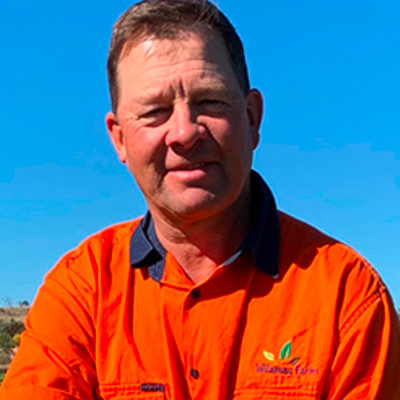
David Haak
Regional Winner | Productivity category
Tent Hill, QLD
David Haak is a horticulture grower at Wilamay Farms and a 2020 Growth Awards Regional Winner in the Productivity category. Read on to learn more about David.
What’s the one thing you have done in your career you are most proud of?
The ability, along with my team at Wilamay, to achieve an efficient production system on any farm I manage. Across the different properties I have worked, I put into place practices which ensure that the operation has maximum efficiency and productivity. As an example, in my current role we are producing a range of crops including baby salad leaf, spinach, kale and rocket. I’ve put into place routines that help maximise efficiency. That means things like seeking out a new seeder. The previous seeder had been used for many years, but we found one to do the job better. It is easier to work with, uses 20 per cent less seed and has a 20 per cent higher germination. We’ve also developed a regime for chemical application, drawing up a protocol for when the best conditions to use a spray are, rather than just apply it. It allows us to get the maximum performance from using those sprays. The team and teamwork are critical - every one of the crew I work with is key in our success.
How will you share what you learn with others in the industry?
Sharing knowledge can be achieved by discussions with different people and I am a big one for sharing what we have learnt. Of course, some things are trade secrets but for the bulk, we are happy to share what has worked well for us. When you meet with others, it’s a good time to discuss what is happening on your farm and while I am not part of a group that meets regularly, I’d be happy to be part of any meeting that could offer an opportunity to discuss what I have learnt.
What do you see as your biggest opportunity in the next 12 months?
The company I work for has just bought a new property and we are in the development phase. I live on the new farm and we are developing it from scratch as it had not been farmed for many years. The next 12 months will present the chance to get this property into a usable condition, to build up the soil fertility and reduce the weed bank. We don’t grow a lot of crops during the summer with our major season running from March until September. So by next March, we would be looking to bring it into full production by improving nutrient levels and building up the soil. That will also involve setting up automatic irrigation which will be permanent, more efficient and can be turned on and off remotely.
What is the biggest barrier to achieving success in the next 12 months?
Water availability is the biggest barrier to our success. It’s why Wilamay Farms bought two new properties in the past 12 months with the goal of improving water security. It is a risk management strategy given the Lockyer Valley has not had significant rain since 2013. Without secure water and substantial rain, our business and the others in this region will be in serious trouble. But it is about mitigating that risk, and while these properties we are developing are a blank slate, we are working to ensure the irrigation water that does come with them, is used efficiently.
What is the biggest challenge Australian Ag has to overcome in the next 10 years?
Water security is one of the biggest factors facing agriculture and maximising efficiencies and outcomes for that water. In 30 years in the industry, things only appear to be getting drier and worse. You don’t see the creeks run now that you did 20-30 years ago. The government and other stakeholders need to get on board and help build and improve water practices and infrastructure. If you can get water use that is fair for everyone, then that would be really good.
I’m a big one for getting a pipeline from Wivenhoe Dam. There is a recycle pipeline that runs from Brisbane to Wivenhoe Dam and when they built the pipeline, the dam was at 16 per cent capacity so recycled water could be used. It’s being able to get the likes of those stakeholders on board to develop those water practices and to see the benefits across a number of industries for the future.